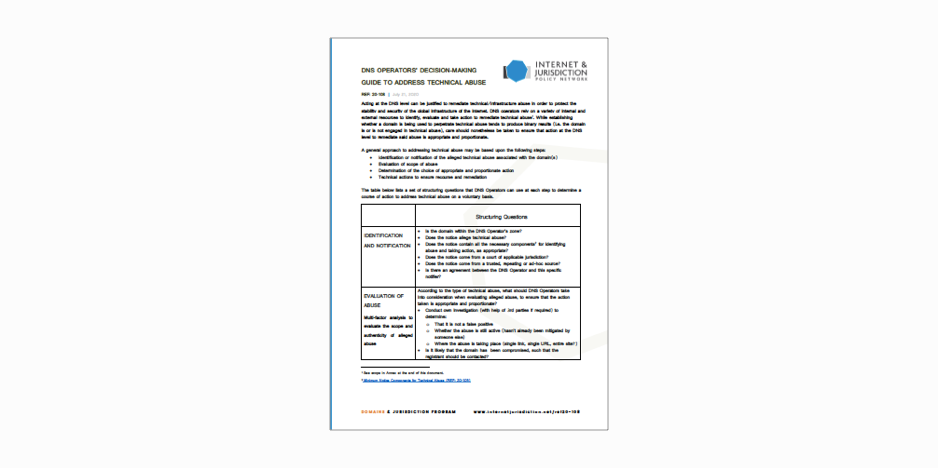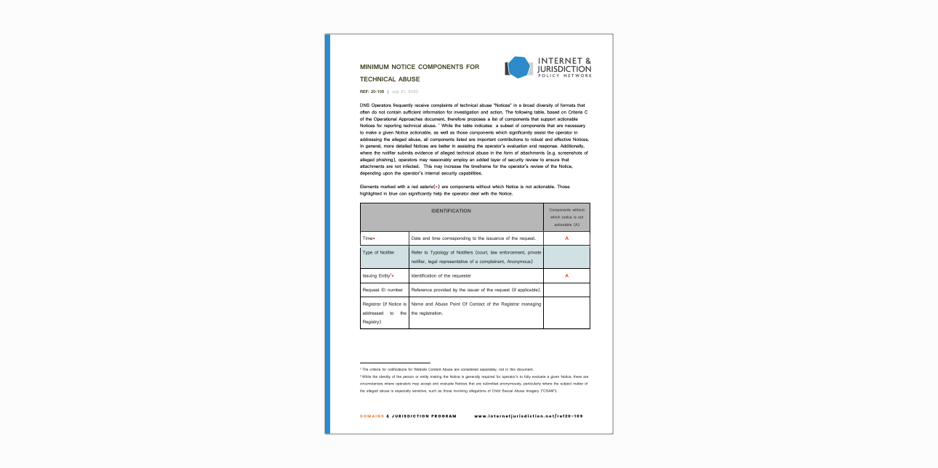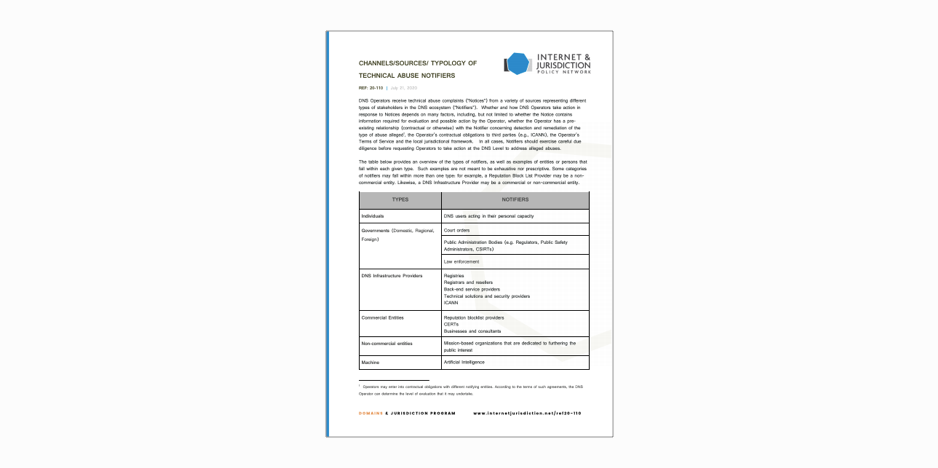The Internet & Jurisdiction Policy Network Domains & Jurisdiction Program Contact Group has prepared three resources to equip Domain Name System (DNS) Operators and technical abuse notifiers with the tools they need to address technical abuse at the DNS-level.
Download the new I&J Outcome: DNS Operators’ Decision-Making Guide to Address Technical Abuse (REF: 20-108)
Download the new I&J Outcome: Minimum Notice Components for Technical Abuse (REF: 20-109)
Download the new I&J Outcome: Channels/Sources/Typology of Technical Abuse Notifiers (REF: 20-110)
To equip Domain Name System (DNS) Operators and technical abuse notifiers with the tools they need to address technical abuse at the DNS-level, over 30 senior-level global key actors from governments, internet companies, technical operators, civil society, leading universities, and international organizations, have worked together in the Internet & Jurisdiction Policy Network Domains & Jurisdiction Program Contact Group, to prepare three resources:
- DNS Operators’ Decision-Making Guide to Address Technical Abuse (REF: 20-108)
- Minimum Notice Components for Technical Abuse (REF: 20-109)
- Channels/Sources/Typology of Technical Abuse Notifiers (REF: 20-110)
The resources are intended to assist DNS Operators in identifying, evaluating, and remediating technical abuse. They have been developed to improve the quality and actionability of DNS technical abuse notifications by helping to ensure that notices contain sufficient information to allow DNS Operators to effectively and efficiently address notices.
Meet the Members of the Domains & Jurisdiction Program Contact Group
The DNS, as the “phonebook of the internet”, saves internet users the burden of memorizing Internet Protocol (IP) addresses. Thanks to the DNS, information can be accessed online through domain names, for example, nytimes.com or lemonde.fr. DNS Operators (Registries and Registrars) receive orders and requests from a variety of sources, including law enforcement, rights holders and other entities, to take action to remediate abuse. Such orders and requests are increasing and often arise without full knowledge of the impact of such action on the general functioning of the internet. This can lead to geographically and substantively disproportionate outcomes.
DNS Operators receive technical abuse complaints (“Notices”) from a variety of sources representing different types of stakeholders in the DNS ecosystem (“Notifiers”). The document provides an overview of the types of notifiers, as well as examples of entities or persons that fall within each given type.
DNS Operators frequently receive complaints of technical abuse “Notices” in a broad diversity of formats that often do not contain sufficient information for investigation and action. The resource proposes a list of components that support actionable Notices for reporting technical abuse.
DNS Operators receive technical abuse complaints (“Notices”) from a variety of sources representing different types of stakeholders in the DNS ecosystem (“Notifiers”). The document provides an overview of the types of notifiers, as well as examples of entities or persons that fall within each given type.
The resources build on the outcome of the work of Members of the Internet & Jurisdiction Policy Network’s Domains & Jurisdiction Program Contact Group. In 2019, the Members developed a set of Operational Approaches that provide stakeholders with common Norms, Criteria, and Mechanisms regarding cross-border DNS-level action to address abuses.
The Internet & Jurisdiction Policy Network is the multistakeholder organization addressing the tension between the cross-border internet and national jurisdictions. It engages over 300 entities from governments, the world’s largest internet companies, technical operators, civil society groups, academia, and international organizations from over 50 countries.





